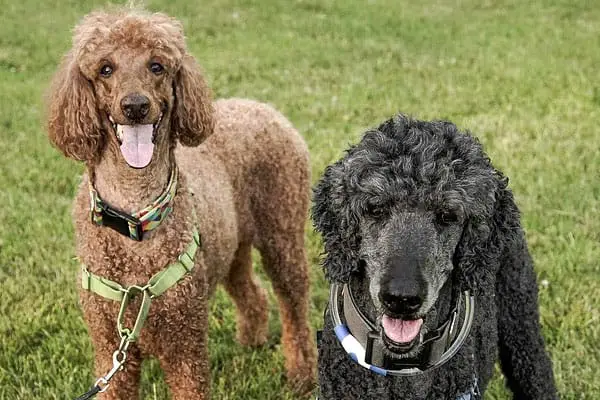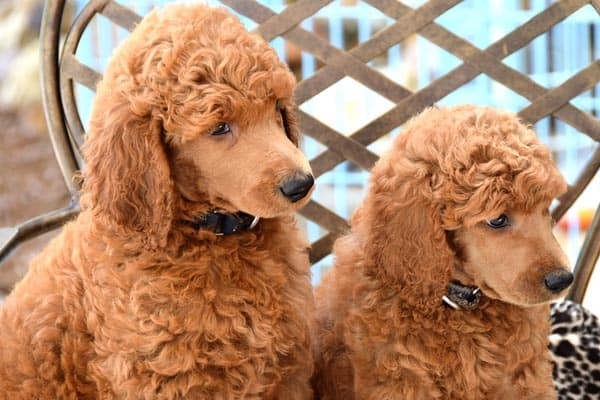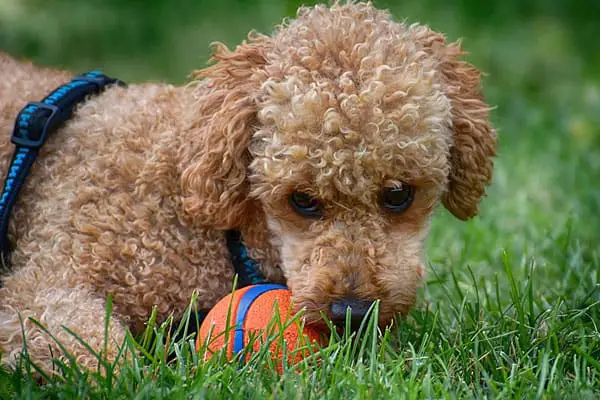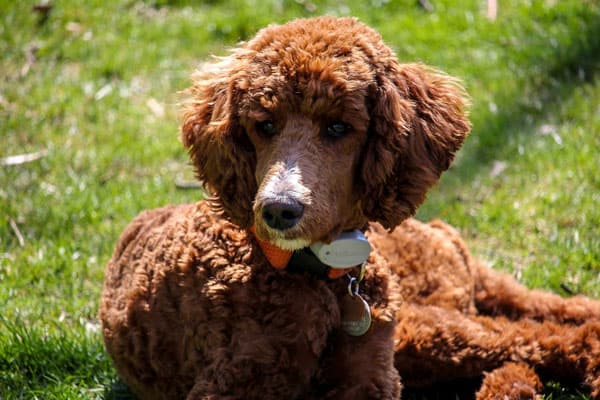Boykin Spaniel Poodle Mix: Newer and More Compact Doodle Gundog
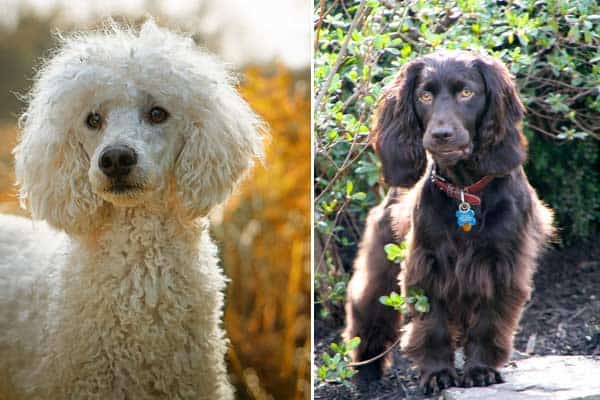
They may not cross your mind very often, but Boykin Spaniel Poodle mixes are one of the up-and-coming crosses of the 2000s. Once you see one, its appeal is evident.
What likely springs to the forefront next is whether you should get one and its suitability as a family pet for an average dog lover. How much care and attention will it need?
The Boykin Spaniel Poodle mix is a designer dog that combines the working qualities, intelligence, and loving personality of two historical sporting dogs.
One prominent goal is to reproduce the Poodle’s hypoallergenic coat. Two size varieties exist depending on whether a breeder uses the Standard or Miniature Poodle.
Boykin Spaniel Poodle hybrid, or Poodle Kin, is most commonly a small to medium-sized dog with a liver-colored curly coat, large soft eyes, and hanging ears. These Doodles are energetic and interactive, social with kids and other dogs alike.
Is a Boykin Spaniel Poodle Mix Right for You?
Reasons Why You Shouldn’t Get a Boykin Spaniel Poodle Mix
Despite their numerous desirable qualities, Poodle Kins do not make suitable pets for everyone.
- May have extensive grooming requirements
- High exercise requirements
- Can become easily bored with training
- Can be too active for small children
Reasons Why You Should Get a Boykin Spaniel Poodle Mix
Fanciers seek the Boykin Poodle cross for various reasons.
- Sociable – get along with kids and other dogs
- Loving
- Loyal
- Often have a low-shedding hypoallergenic coat
- Playful
Appearance, Personality, Coat and colors, Lifespan, and Traits of a Boykin Spaniel Poodle Mix
The Boykin Spaniel is a medium-sized dog with a shoulder height of 14 to 18 inches and a weight of 25 to 40 pounds. Dogs are universally chocolate (liver in this breed). They are permitted by show parameters to have a spot of white at the chest.
A Boykin Spaniel has a coat similar to a Cocker Spaniel with waves on the body, curls in the topknot, extensive feathering on the ears and legs, and a thin undercoat.
Boykin Spaniels originated in the early 1900s in South Carolina in the US. They were bred to hunt and retrieve ducks and wild turkeys in the swampland around the Wateree River.
Their small size enabled hunters to transport the dogs with them on gear-loaded boats. Like other spaniels, Boykins flush birds into the open and retrieve them once they have fallen.
Poodles have a murkier history than Boykins. They are thought to have originated in Germany from Barbets and other curly-coated dogs. Although around since possibly the 1400s, Poodles were developed in the 1800s to retrieve fowl from the water as well as lost arrows.
Poodles come in three to four size variations depending on the registry. Standard Poodles are 18 to 24 inches tall and weigh 45 to 75 pounds, while Miniatures are 11 to 15 inches high at the shoulders and weigh 15 to 20 pounds. There are also Toy and Medium varieties.
The Miniature Poodle was developed from larger dogs and frequently worked in circuses as well as hunted for truffles.
General Appearance
Poodle Kins are 16 to 19 inches tall at the shoulders and weigh 26 to 50 pounds. You will get a smaller dog if one of the parents is a Miniature Poodle. These crosses are 14 to 16 inches tall and weigh 15 to 20 pounds.
About 20% of Boykin Poodles will look much more like one parent or the other. Most puppies will be an even mix of genes resulting in a dog with round, wide-spaced eyes, medium-sized high-set hanging ears, and a strong straight muzzle that is slightly shorter than the back skull.
The neck is moderately long, allowing for a high-head carriage. Boykin Poodles have compact body that is slightly longer than tall. The back is muscular, and the topline level.
Boykin Spaniel Poodle mixes have well-laid back shoulders that allow an extended reach of the forelegs and powerful hindquarters. The knees and hocks show moderate angulation.
When you look at the tail, it should form a natural line from the slightly sloping croup. Although you are dealing with a mixed-breed dog, the tail can be docked to about a third of its full length.
Personality
Poodle Kins are lively, devoted, and friendly. They tend to be mildly reserved with strangers but will warm up according to your reactions.
The mix makes an excellent watchdog, although not a great guard dog. Boykin Poodles are also highly intelligent and playful.
They simultaneously possess a good work ethic and a predisposition for clownish antics. These dogs can excel at obedience, agility, flyball, and even field trials.
Coat and Colors
Your Boykin Poodle cross is most likely to have fur like a Goldendoodle with wavy to loosely curled low- or moderate-shedding hair. Some dogs may have a sparse undercoat.
In any litter, a few puppies are likely to have the flat straight, or slightly wavy coat of their Boykin parent with a thin protective layer of underfur. Others will have curlier coats, more like Poodles. Multigenerational crosses can make the coat more predictable.
Be aware that some breeders may add various breeds, such as the Goldendoodle, to further improve the coat’s texture and add unusual colors. These crosses are known as Doodle Kins.
Most Poodle Kins are black, rich chocolate, or light liver. Rarely does the cross have any white markings, let alone the flashy pattern of particolored Poodles. Goldendoodles may add champagne and golden brown to the mix.
Traits
Physical and temperamental attributes create traits that you can expect in your Boykin Poodle.
- Fast and agile
- Potentially good bird dogs – can flush and retrieve
- Learn quickly
- Highly trainable
- Not aggressive
Grooming Your Boykin Spaniel Poodle Mix
Like any Doodle, grooming your Poodle Kin depends on what type of coat she inherits.
The curlier the fur, the more often you will need to brush it. Poodle-type hair requires you to brush it at least every other day. If your dog has the coveted loose curls or strong waves, you can brush her two or three times a week. Straight hair needs attention twice a week or more.
Regardless of the hair type, your dog is likely to have furnishings (length increased on the ears, topknot, tail, and abdomen). Frequently, you will have to contend with extensive feathering which is prone to tangles.
Along with brushing, you should bathe your dog every six to twelve weeks. Clip the nails with the same frequency. You should check your dog’s face and ears daily and swab or wipe clean gently as needed.
If you can, get your puppy used to having you handle his feet and mouth. It is beneficial if you brush your dog’s teeth at least three times weekly.
Boykin Spaniel Poodle Health
Lifespan
Your Boykin Poodle mix will enjoy a long life with excellent care and barring unforeseen accidents or illnesses.
Poodles live 12 to 15 years. It is not uncommon for Miniature Poodles to live 16 or 17 years. Boykin Spaniels also have a long life with an expectancy of 14 to 16 years. You can expect your cross to live an average of 13 to 16 years.
Health Issues
You can expect your Poodle Kin to be susceptible to any problems that either of the parent breeds carries. Of course, you see some issues more commonly than others.
- Luxating patellas (Miniature Poodle) – kneecaps float” in and out of position
- Hip dysplasia
- Sebaceous adenitis – inflammation of the sebaceous glands; causes skin irritation and hair loss
- Heart disease – valve degeneration and pulmonic stenosis (narrowing of a major artery in the heart)
- Food allergies and intolerance
- Progressive retinal atrophy – thin tissue responsible for color and night vision degenerates over time, and the dog eventually goes blind.
- Endocrine disorders from Poodles – Cushing’s disease (too many steroids from pituitary or adrenal tumor), diabetes (poor regulation of blood sugar levels), and Addison’s disease (insufficient steroids with subsequent potassium and sodium irregularities)
- GDV or bloat – gastric torsion whereby the stomach twists secondary to its swelling with food and gas or liquid
- Cataracts – can be late-onset, juvenile (strikes at 1 to 3 years of age), or secondary to diabetes; involves thickening and opacity of the lens, obstructing the affected dog’s vision.
Boykin Spaniel Poodle Mix Food Requirements
Feeding your Boykin Poodle mix is straightforward, with a caloric requirement of 27 to 32 calories per pound of body weight every day. Animal proteins should make up the major ingredients in your dog food, whether you choose kibble, fresh food, a canned diet, or raw meat.
If you feed homemade or raw diets, you should ideally weigh your dog’s meals. Your pet will need 2% to 3% of his weight in food daily. Consult with your veterinarian or nutritional specialist to achieve balance and the appropriate number of vitamins and minerals.
While fats are also essential to your dog’s diet, carbohydrates remain hotly debated. Dogs do not require carbohydrates in their diets but have evolved to be able to extract usable energy from them. To further complicate matters, grain-free foods may have implications for cardiomyopathy (a potentially fatal enlargement of the heart).
Scientists still struggle to determine if nutritional deficiencies develop in dogs where grains and other protein sources are replaced by potatoes and legumes (a common practice in grain-free dog food).
When you decide what to feed your dog, divide the portions into at least two separate meals a day. This can help prevent bloat in deep-chested breeds.
Boykin Spaniel Poodle Exercise Requirements
You should plan to provide 60 to 90 minutes of daily exercise for your Boykin-Poodle. Most dogs reap the greatest benefits from exercise that is split into a couple of sessions.
Exceptions exist, such as when you take your dog on an hours-long outing over the weekend or engage in intense training for a competition.
You should substitute training for most of the physical aspects of your young pup’s exercise routine. Besides what they do on their own playing, puppies should only engage in daily walks and other physical activities equivalent to five minutes of exercise for each month of age.
Thirty minutes are sufficient for dogs from six months to a year of age. Dogs of all ages need the mental engagement that training and interactive games provide.
Boykin Spaniel Poodle Training
Dogs in the sporting group are famously cooperative and easy to train. Boykin Spaniels are no exception, with their eagerness to please and easygoing attitude.
Poodles of all types are among the smartest of dogs, with a strong willingness to learn. Combined, you will get a dog that most likely resembles a Schipperke (No. 15), Miniature Schnauzer (No. 12), or English Springer Spaniel (No. 13) in working intelligence.
Although their combination of personality traits and cleverness make them relatively easy to train, Boykin-Poodles also become easily bored. You must temper the repetition needed to train your puppy with variations in methods and short sessions.
Another training challenge is that spaniels are sensitive and will shut down with the use of a raised voice or show of force. Boykin Spaniel Poodles mixes respond to positive reinforcement, rewards, and well-timed minor corrections.
Boykin Spaniel Poodle Mix and Families
Although Poodle Kins have the high energy levels of working dogs, they make excellent family companions for active couples, singles, or households with children.
Boykin-Poodles are playful and sturdy enough to handle the rambunctious play of children. Their liveliness may not be a great fit for toddlers.
They must always be supervised when interacting with kids under the age of eight or nine years. Some lines are timider than others, but it is the rare individual that does not enjoy children.
Boykin Poodles can be initially wary of strangers but are generally friendly and accepting if your demeanor illustrates there is no threat. Boykin Spaniel Poodle crosses make effective watchdogs, barking to introduce your company or to signal something suspicious.
Poodle Kins prefer to remain by your side. Alone for too long, and they will pick up bad habits such as excessive barking, digging, pacing, and chewing.
Socializing your dog is important, or she can end up shy, fearful, or inexplicably aggressive. Much of the reason Boykin Poodles make such good family dogs is that they are nonaggressive and easy-going as long as they get plenty of attention and exercise.
Boykin Spaniel Poodle Mix and Other Pets
Boykin Spaniel Poodle crosses, like their parent breeds, tend to get along with other dogs. You should use caution with large dogs if your pup is the offspring of a Miniature Poodle parent.
Boykin Poodles also potentially get along well with cats, especially kittens they grow up with. However, with their pleasant approach to life and sociable nature, Boykin-Poodles should also coexist peacefully with adult cats that live with you.
With their lower-than-average prey drive, your dog is also not as likely as some other breeds to chase the neighborhood cats. However, you should not trust your dog with birds, reptiles, rabbits, or rodents (i.e., gerbils and hamsters).
Example
This is a classic Boykin Spaniel Poodle mix with physical characteristics that reflect an even blend between the parent breeds. Many Boykin Poodles inherit a curlier coat than other Doodles.
Note that this dog’s tail is docked. Most dogs have the deep liver or chocolate coat that you see.
